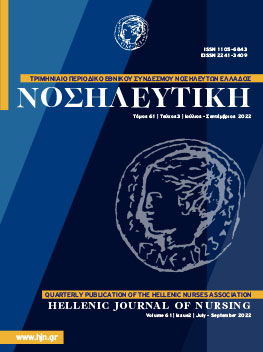
About Journal
“Hellenic Journal of Nursing” is the official scientific journal of the Hellenic Nurses’ Association (H.N.A.) which has been published since 1962. Its contents and full abstracts are available in the Greek Medical Database “IATROTEK” (2002) and in “CINAHL” (2008), the Cumulative Index to Nursing and Allied Health Literature, in “EBSCO” (2009) International Databases, as well as in “SCOPUS” (2010).
Hellenic Journal of Nursing” is published quarterly and is addressed both to nurses –covering all specialties– and to other health professionals.
Scope: Its scope is to contribute to continuing nursing education, to en- courage nursing research and to promote the ongoing development of evidence-based practice in Greece and Internationally.
ISSN 1105-6843
EISSN 2241-3409
PUBLISHER / EDITOR-IN-CHIEF
Kyritsi – Koukoulari Eleni
RN, PhD, Professor, Nursing Dept. University of West Attica
 English
English  Ελληνικά
Ελληνικά 

